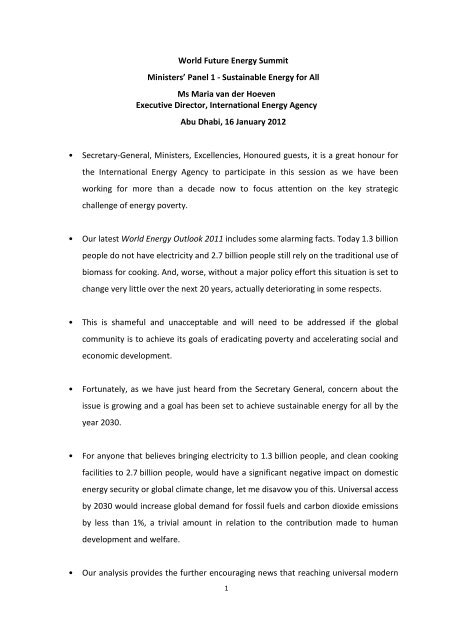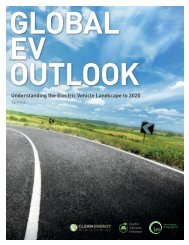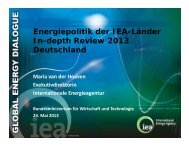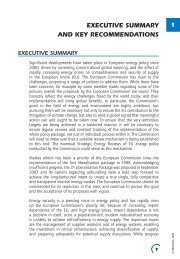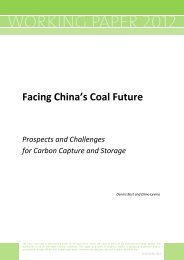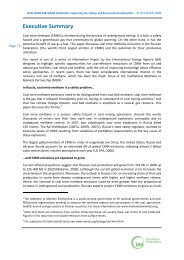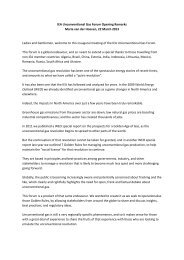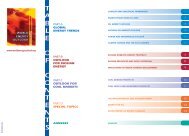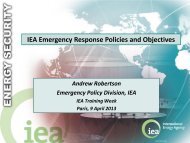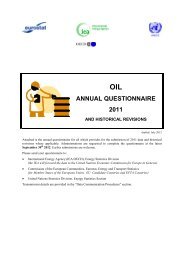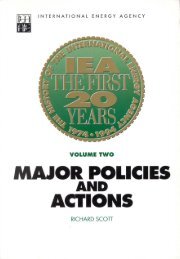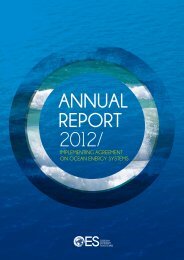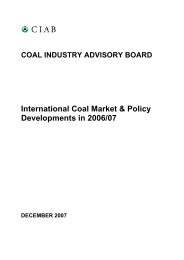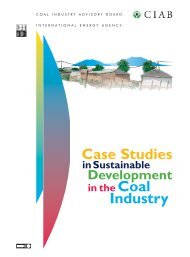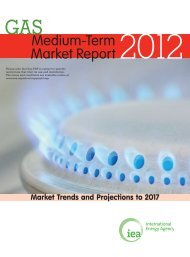Speech - IEA
Speech - IEA
Speech - IEA
Create successful ePaper yourself
Turn your PDF publications into a flip-book with our unique Google optimized e-Paper software.
World Future Energy Summit<br />
Ministers’ Panel 1 - Sustainable Energy for All<br />
Ms Maria van der Hoeven<br />
Executive Director, International Energy Agency<br />
Abu Dhabi, 16 January 2012<br />
• Secretary-General, Ministers, Excellencies, Honoured guests, it is a great honour for<br />
the International Energy Agency to participate in this session as we have been<br />
working for more than a decade now to focus attention on the key strategic<br />
challenge of energy poverty.<br />
• Our latest World Energy Outlook 2011 includes some alarming facts. Today 1.3 billion<br />
people do not have electricity and 2.7 billion people still rely on the traditional use of<br />
biomass for cooking. And, worse, without a major policy effort this situation is set to<br />
change very little over the next 20 years, actually deteriorating in some respects.<br />
• This is shameful and unacceptable and will need to be addressed if the global<br />
community is to achieve its goals of eradicating poverty and accelerating social and<br />
economic development.<br />
• Fortunately, as we have just heard from the Secretary General, concern about the<br />
issue is growing and a goal has been set to achieve sustainable energy for all by the<br />
year 2030.<br />
• For anyone that believes bringing electricity to 1.3 billion people, and clean cooking<br />
facilities to 2.7 billion people, would have a significant negative impact on domestic<br />
energy security or global climate change, let me disavow you of this. Universal access<br />
by 2030 would increase global demand for fossil fuels and carbon dioxide emissions<br />
by less than 1%, a trivial amount in relation to the contribution made to human<br />
development and welfare.<br />
• Our analysis provides the further encouraging news that reaching universal modern<br />
1
energy access by 2030 will not cost the earth. We estimate it can be achieved with<br />
total investment of $1 trillion – an average of $48 billion per year. That is, however,<br />
more than five-times the level of investment that is currently going towards<br />
extending access to modern energy services, so a major ramp up in investment is<br />
definitely needed.<br />
• The upcoming Rio+20 Summit represents an invaluable opportunity for the<br />
international community to recognise that the current situation is intolerable,<br />
commit itself to effect the necessary change and set targets and indicators to<br />
monitor progress. To contribute to what will hopefully be an extremely successful<br />
meeting in Rio, the <strong>IEA</strong> is currently working on a number of major reports that will<br />
provide input to the High-level Group to Rio+20.<br />
o The first examines the objective of universal energy access by 2030, the scale<br />
of the challenge and the ways in which the UN Sustainable Energy for All<br />
initiative can help to facilitate its achievement.<br />
o The second looks at the targets that have been put forward of doubling the<br />
rate of improvement in energy efficiency and doubling the share of<br />
renewable energy in the global energy mix. Based on our World Energy<br />
Outlook analysis, it is clear that these are both ambitious targets, and<br />
meeting them will require strong commitment from governments, the<br />
private sector and civil society. But as the world’s demand for energy services<br />
will inevitably continue its strong growth with rising population and<br />
prosperity in the emerging economies, it is imperative that we consume<br />
energy more efficiently and that the energy comes from lower-carbon<br />
sources.<br />
• Let me close by stressing that there are three global energy challenges that are<br />
equally important: (i) energy security; (ii) achieving a sustainable energy future, and<br />
(iii) energy access for all. These three challenges are clearly interlinked, and they<br />
must all be tackled if any one of them is to be achieved. As energy security is at the<br />
2
core of the <strong>IEA</strong>’s remit, so we recognise that energy security cannot genuinely be<br />
achieved until it is achieved for all.<br />
3


